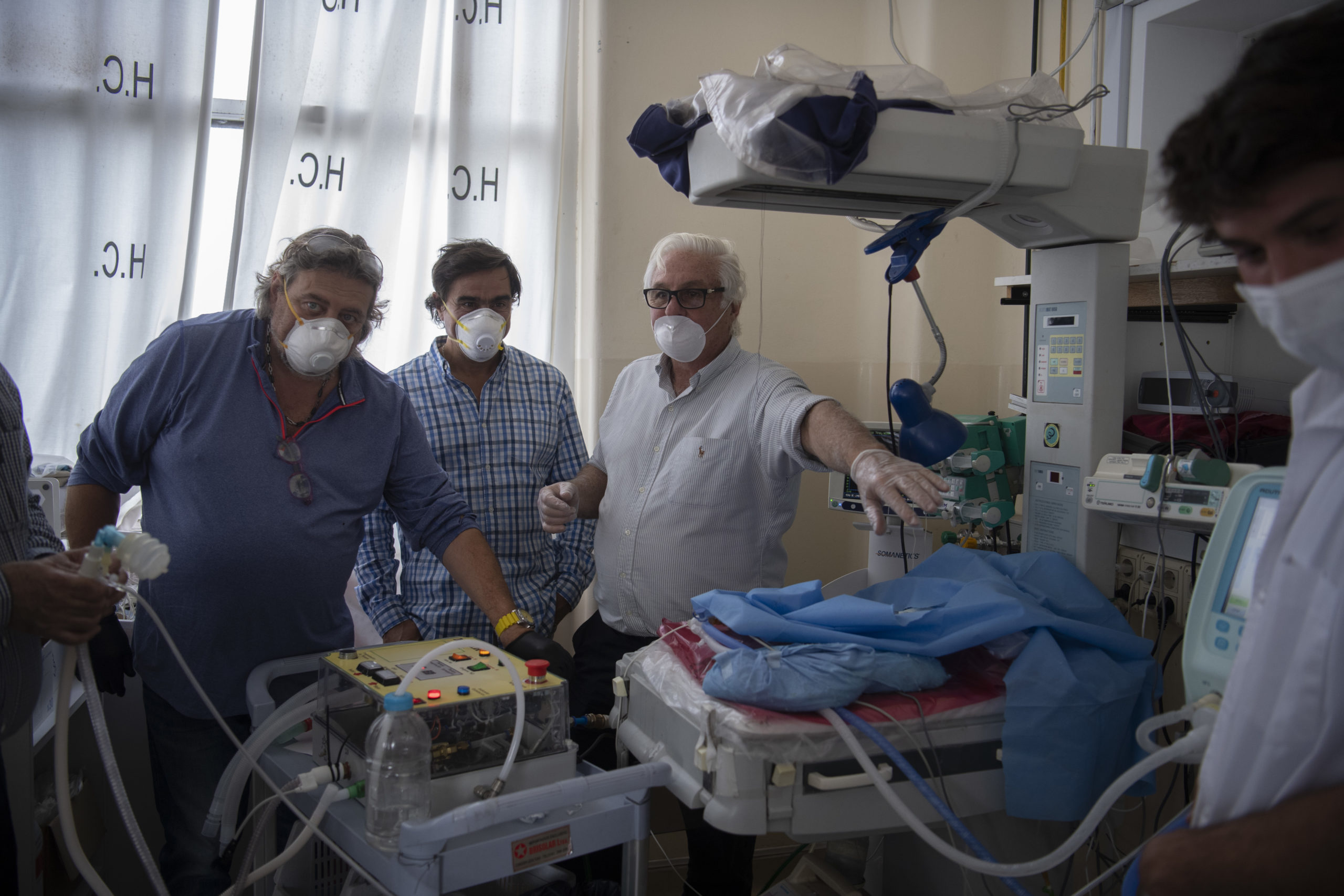Famous Andes crash survivor building virus ventilators

Doctor Roberto Canessa, one of the 16 survivors of an airplane crash in the Chilean Andes in 1972 and who remained lost in the mountains for 72 days, speaks with a group of robotics engineers and doctors while they prepare a ventilator being developed as part of the fight against the novel coronavirus COVID-19, for testing at the neonatology laboratory in the Clinicas Hospital, of the Faculty of Medicine of the University of the Republic (Udelar), in Montevideo, on April 22, 2020. – When the coronavirus pandemic arrived in Uruguay, doctor Roberto Canessa, one of the 16 survivors of an airplane crash in the Chilean Andes in 1972, developed a rudimentary ventilator to help patients. He then partnered up with robotic engineers and doctors to develop four additional ventilators that are currently being tested to help COVID-19 patients. (Photo by Pablo PORCIUNCULA / AFP)
MONTEVIDEO, Uruguay — Roberto Canessa survived a plane crash in the Andes and 72 days battling extreme weather, hunger, and the fear of dying while stranded in a frozen mountain range.
Now, the 67-year-old cardiologist has vowed to take on the coronavirus pandemic in his native Uruguay by building ventilators.
In 1972, Canessa was one of 45 people on a plane traveling from Uruguay to Chile with a rugby team on board when it crashed in the Argentine Andes.
Some died on impact, others from their injuries, and yet more from hunger. But 72 days later, 16 survivors were rescued.
Alongside fellow rugby player Fernando Parrado, Canessa braved freezing conditions, terrifying wilderness, inhospitable terrain, and a lack of suitable clothing, setting out on a journey to find help even though they had no idea which way the nearest town might be.
Article continues after this advertisementThe tragedy and their epic journey were made into a Hollywood feature film, “Alive,” starring Ethan Hawke.
Article continues after this advertisementNow, Canessa wants to save more lives.
“When I saw that around the world people were dying from a lack of air, it reminded me of the mountain, when I saw my friends who couldn’t breathe anymore, and I said: No, this can’t happen to me again,” Canessa told AFP, moments after testing the latest prototype of his ventilator.
As the virus spread, he realized that although superpowers like the United States and China were going to be able to buy or make ventilators, “Uruguay wasn’t.”
“That’s something I also learned on the mountain: I was here, I needed to get out, I had to start walking, I didn’t know how far I had to go, but with every step, I would be closer” to a possible rescue, he said.
Now, “I wanted to get closer to a ventilator.”
His fame as a miracle survivor of the Andean tragedy helped attract support for his cause.
It took only a few days to produce a first model, which he christened “Charrua” — naming it after an indigenous group from Uruguay and parts of neighbors Argentina and Brazil.
The WhatsApp group Canessa created — called “Respiradores” or Ventilators — has 80 volunteers including pneumatic, electric, and robotics engineers working on four models that they have designed and built.
‘If you need it, use it’
The aim is to make as many as possible. But first, they need to be tested and calibrated, something that began on Wednesday in a Montevideo hospital.
Compared to ventilators made by specialist companies, which cost around $20,000 each, these can be made for as little as $1,200.
And so far, Uruguay has time on its side. In a country of 3.5 million people, there have been just 550 cases and 12 deaths.
It’s afforded the country time to build a “more sophisticated” ventilator, said Canessa.
Fernanda Blasina, director of the neonatology department at the University of the Republic hospital in Montevideo, says intensive care tests are being carried out on a newborn piglet to “evaluate treatments and different equipment.”
And while Canessa acknowledges the government may be skeptical about ventilators made “in a garage” — “when the people are desperate, the public health ministry will have to use it.”
“My obligation as a citizen is to say: I have this, if it’s useful; if you need it, use it.”
/MUF
For more news about the novel coronavirus click here.
What you need to know about Coronavirus.
For more information on COVID-19, call the DOH Hotline: (02) 86517800 local 1149/1150.
The Inquirer Foundation supports our healthcare frontliners and is still accepting cash donations to be deposited at Banco de Oro (BDO) current account #007960018860 or donate through PayMaya using this link.